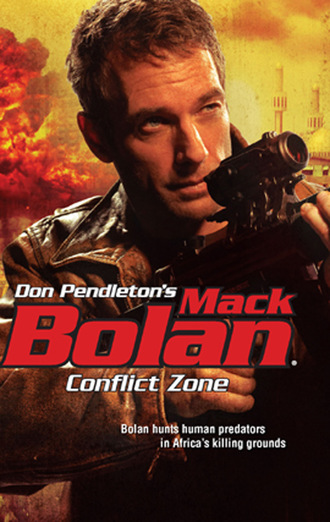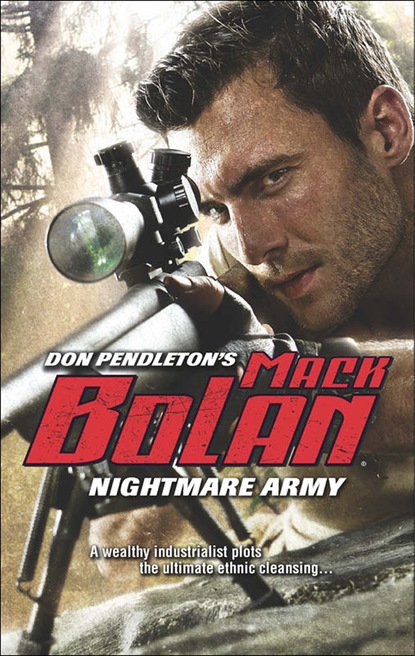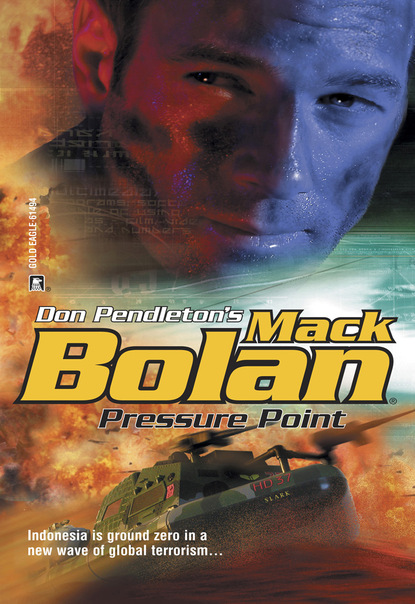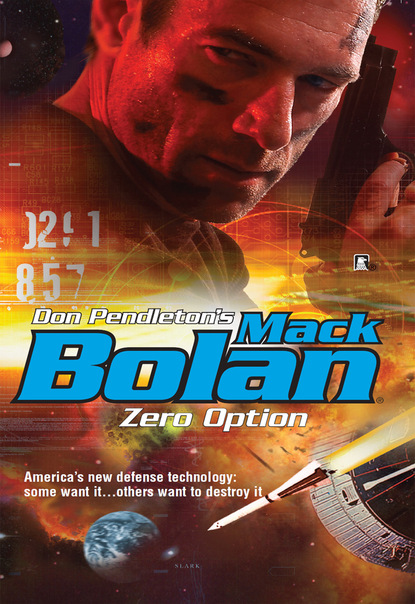
Полная версия
Conflict Zone
“I have, sir,” Teoh confirmed. “The ‘J5’ prefix indicates official registration in Guinea Bissau.”
“What brings it here, then?” Chan wondered out loud.
“I’m afraid we don’t know, sir.”
“But can we find out? That’s the question, eh, Lao?”
“As you say, sir.”
Subservience had its limits. Although he enjoyed wielding power, beyond any question, Chan sometimes wished for aides who displayed more initiative than simple fawning obeisance.
“We once had eyes inside K-Tech Petroleum,” Chan said.
“She was dismissed, as you recall, sir. Their security discovered her communications with our private operative.”
“Yes, a nasty business.”
“Thankfully resolved,” Teoh added, “by her suicide.”
If such it was. Chan had been raised from infancy to trust the state and to deny religion in all forms, but he wasn’t inclined to question a convenient miracle. And if someone in his employ had helped the burned spy to decide that her life was intolerable, how was Chan to know?
“Make every effort to identify the latest visitors,” he ordered. “Maintain tight surveillance on the K-Tech grounds and staff. Inform me instantly of any new and unfamiliar faces on the scene.”
“Yes, sir.”
“And while you see to that,” Chan said, “I will attempt to pacify our Itsekiri friends.”
THE WARRI headquarters for Uroil—with its home office in Yekaterinburg, on the eastern slope of the Ural Mountains—stood a mere two thousand yards from the office building owned by China National Petroleum. Its drab gray walls and modest logo gave nothing away to passersby.
“Bad news for the Chinese today, I take it,” Arkady Eltsin said. “And their underlings, too.”
“Unfortunately, not so bad for the Americans,” Valentin Sidorov replied.
As an agent of Russia’s Foreign Intelligence Service—known as the SVR—Sidorov answered first to Moscow, but his present orders placed him at Uroil’s and Arkady Eltsin’s disposal. Eltsin understood that his command of Sidorov had limits, and he hadn’t tested them.
Not yet.
“The Ross girl,” Eltsin said, nodding. “Who was it, do you think? The CIA?”
“I doubt it,” Sidorov replied. “The quality of personnel available to them is scandalous, these days. So much of what they used to do is handled now by private military companies, it’s doubtful they could manage any kind of paramilitary operation. Or that they would risk it, in the present climate.”
Eltsin knew what that meant, as would anyone who’d watched the great United States in recent years. After declaring “war on terror,” Washington had botched the liberation of two nations from Islamic dictators, had let bin Laden slip away despite repeated vows to punish those responsible for 9/11 and had alienated most of its long-time allies in the process. The CIA, while given carte blanche to abduct and abuse suspected terrorists in the guise of “extraordinary rendition,” was kept on an increasingly short leash in other spheres.
“Remember Cuba?” Eltsin asked, then snorted. “No, of course you don’t. You weren’t born yet, for God’s sake!”
“I’m familiar with the history,” Sidorov replied.
“I was going to say that Langley couldn’t manage a new Bay of Pigs nowadays, but forget it. Who do you suspect?”
“No one yet. Without more information, I’d only be guessing.”
“So guess,” Eltsin urged. “We’re all friends here, supposedly. Let your hair down for a change.”
That was funny, considering Sidorov’s buzz cut that left his scalp shining through stubble, but Eltsin refrained from laughing at his own bon mot.
“All right, if you insist. One of the private firms, most likely. There were nineteen in America, at last count, half a dozen in the U.K., and at least one each from Australia, Japan, Norway and South Africa. Take your pick from Raytheon, Gray Talon, Omega or any of the rest.”
“That doesn’t exactly narrow it down,” Eltsin chided.
“How can I? If the individuals responsible could be identified…”
“It would accomplish nothing, I suppose, to ask our Ijaw comrades?”
“I’m told the girl was rescued by a white man,” Sidorov replied. “The Ijaw would not hire one, even if they could afford the going rate for such an operation. And why would they wish to help K-Tech Petroleum?”
“To vex the Itsekiri, I should think,” Eltsin replied.
Sidorov frowned, considered it and shook his head.
“No. They might raid the camp themselves and steal the girl, then ask for ransom on their own behalf. But as it is, they hate white foreigners as much as Afolabi’s people do.”
“They don’t hate us,” Eltsin reminded him.
“You think not? Dam the flow of money to their war chest, and find out how loyal they are to Mother Russia.”
“You’re a cynic, Valentin.”
“A realistic judge of human nature,” Sidorov said, correcting him.
“You think they’re human, then? I’m not so sure,” Eltsin said.
“They’ll surprise you, one day, when you least expect it,” Sidorov replied. “It won’t be pretty.”
“Perhaps, when we have pumped their country dry,” Eltsin returned. “Not as long as they’re in love with money and have something left to sell.”
“I’ll reach out to Ajani and Jumoke,” Sidorov told Eltsin. “There’s a chance that we can stir the pot a bit, after this incident.”
“And see what floats up to the top,” Eltsin replied. “Vodka, before you go?”
“WHY AREN’T YOU coming with me?” Mandy Ross demanded, staring down her father with a measure of intensity he’d thought impossible for one so pampered.
“Hon,” he said, “we’ve been all over this. You know the answer. This is where I work. I have to be here.”
“No, you don’t!” Mandy insisted. “Let somebody else come in and man the shooting gallery. Somebody—”
“Younger?” he anticipated her, half smiling.
“Older,” she replied. “Someone who’s finished living anyway, and doesn’t have a family. Someone who won’t mind being shot or blown to pieces by a pack of murderers.”
“I can’t just cut and run,” Ross said.
“Oh, wait—I know this one. Because it isn’t manly, right? I’ve got a news flash for you, Dad. Even Dirty Harry knew when to quit. A man should know his limitations.”
That made him bristle. “Are you saying I’ve reached mine?”
“That’s right!” she said. “For this place, here and now, I am. There’s nothing in this country worth your life. The money doesn’t matter.”
“You say that because you’ve always had it,” he replied.
“I’ve always had you, too. Ask me which one I’d rather do without.”
“Mandy, this trouble should be settled soon.”
“Oh, sure. And it’s been going on how long, now? Since the sixties? We learn history at Vassar, Dad. I’ve learned that nothing ever changes for the better here.”
“It may surprise you.”
“With your funeral?”
Ross felt his irritation slipping over into anger.
“That’s enough!” he snapped. “You’re on the jet in one hour and out of here, even if Clint has to hog-tie you. Got it?”
“Right, then.” He couldn’t tell if her eyes were glassy with anger or brimming with tears. “Will you at least send Cooper with me?”
“Who?”
“Matt Cooper. Jesus, Dad! The man who saved my life? Does any of this ring a bell?”
“Sorry,” he said. “We weren’t exactly introduced.”
“Whatever. Can he drive me to the airport?”
“Sorry, no. He’s gone already,” Ross told her, fudging it, unsure if that was literally true or not. “His job’s not done, apparently.”
“Apparently? As if you didn’t know.”
“He doesn’t work for me, Princess.”
“I see. He does a good deed every day, and this time he just happened to select Nigeria. Makes perfect sense.”
“He was referred to us, all right? By whom, I couldn’t say. That kind of thing is need-to-know, and it appears I don’t.”
“I swear, Dad, sometimes—”
“If you plan on packing anything, you need to start right now,” he warned. “One hour till your flight. Tick, tock.”
She turned and fairly stormed out of the office, which was bad, in terms of parent-child relations, but a bonus if it got her moving without any further argument. When she was gone, he buzzed Clint Hamer in.
“All ready, boss?” asked K-Tech’s top security consultant in Nigeria.
“We’re getting there. You know the drill, right?”
“Absolutely. Straight out to the airport, wait until she’s airborne, then straight back.”
“And anyone who tries to stop you on the way—”
“Will wish he hadn’t, while he’s bleeding out,” Hamer replied.
“Sounds fair to me,” Jared Ross said.
BOLAN HAD half expected that the loaner car would be a classic from Detroit, but K-Tech had surprised him. He supposed it stood to reason, after all. When they were pumping oil from five continents, why would the corporate brass care whose engine burned the fuel and spewed its waste into the atmosphere?
So, he was looking at a reasonably new and clean Toyota Yaris, four doors and a hatchback, in some kind of silver-gray shade that he thought should be unobtrusive in traffic. It wouldn’t be the fastest car on the road, or much good for ramming, but Bolan wasn’t planning to enter a NASCAR event.
He needed wheels for pure mobility, and possibly to help him stay alive. If the loaner should be damaged in the process, he’d find some way to replace it.
That was life.
Grimaldi, having taken his advice, wasn’t around when Bolan stored most of his hardware in the trunk. A baggy shirt, unbuttoned and untucked, hid the Beretta 93-R in a fast-draw shoulder rig, with spare mags pouched under his right arm. And just to be on the safe side, he held back a couple of Russian-made RGO-78 frag grenades—the “defensive” model, with ball bearings packed around eighty-five grams of TNT, with an effective killing radius of twenty yards.
Bolan was hoping that he wouldn’t need the pistol or grenades for his preliminary meeting with Obinna Umaru, but he knew that banking on a free ride was the quickest way to wind up lying in a gutter or a shallow grave. He would hope for the best, and prepare for the worst.
He had a map of Warri and an hour to kill before their scheduled meeting at a marketplace on the city’s north side. Bolan decided to spend the time touring his new battleground, and checking for tails in the process.
But first, he wanted to check out the car.
No matter where you went, on every continent, auto theft was a problem. Millions of company cars came with LoJack technology or its equivalent, GPS systems that let the home office keep track of all wheels on the road, for whatever reason. Bolan had no reason to believe that Jared Ross would shadow him, but it was best for all concerned—and Bolan, in particular—if his movements in Warri went unobserved.
Once he was safely off the K-Tech lot, Bolan found a place to park and went to work. He used a simple scanner, the size of a cigarette pack, tuned to the standard LoJack frequency of 173.075 megahertz and found the transceiver hidden underneath the padded liner in the trunk. He took it out, pitched it into a nearby vacant lot strewed with rubbish, and then performed a second scan of the Toyota, running through assorted other frequencies that might betray a second homing device.
His ride was clean.
Now all he had to do was to pass the time until his rendezvous, ensuring that he wasn’t followed from the K-Tech property by either friend or foe.
For in the present situation, either one could get him killed.
Конец ознакомительного фрагмента.
Текст предоставлен ООО «ЛитРес».
Прочитайте эту книгу целиком, купив полную легальную версию на ЛитРес.
Безопасно оплатить книгу можно банковской картой Visa, MasterCard, Maestro, со счета мобильного телефона, с платежного терминала, в салоне МТС или Связной, через PayPal, WebMoney, Яндекс.Деньги, QIWI Кошелек, бонусными картами или другим удобным Вам способом.












